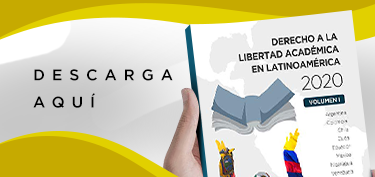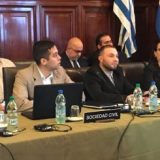International alarm before the exodus of Venezuelan university professors
In Venezuela the flight of intellectual talent has dramatically increased in the recent years, most Venezuelans (especially Venezuelan youth) cross borders in the search of a better quality of life. The main reason for the diaspora is the minimum wage that most professionals earn in Venezuela, which, in March 2018, stood at 1,307,546 Bolívares, that is, only $ 5.7 a month.
The brain drain in Venezuela has been alarming. Aula Abierta, in its report about college desertion shows the following results:
– At the Central University of Venezuela the approximate percentage of professorial desertion rose from 30% to 50%.
– At the University of Carabobo, it is estimated it rose at 50%.
– In the University of Zulia (Faculty of agronomy) professorial desertion is located in 35%. In the last two years more than 30 concourse were offered, in which only 2 – 3 applicants attended on average.
– At the “Universidad de Oriente”, a figure of 20% was obtained, which only has 120 ground educators for an enrollment of 2,500 students.
Professionals in University education field in Venezuela do not escape the serious economic and social situation Venezuela is experiencing. A full-time academic at a Venezuelan university earns a salary equivalent to $ 13.81 (until March 19, 2018), while a full-time professor earns $ 11.37. This leaves the economic factor as one of the triggers of the flight of intellectual talent.
Derisory assignments to researchers
Another factor influencing professors’ exodus is the lack of contributions for professors dedicated to scientific research, which is not only present in university programs, but also within the Research and Innovation Stimulus Program (PEII by its acronym in Spanish), where the researchers receive an economic allocation that, within the Venezuelan context, it is not useful for developing any research project. For example, a level C researcher, who needs to have a doctorate degree, receives about € 0.87 according to official rate of 54,020.63 x 1 €.
Deficiencies in the Integrated Health System of the Ministry of University Education (SISMEU)
In March 2017, a new system called “Integrated Health System of the Ministry of University Education” (SISMEU by its acronym in Spanish)”, managed directly by the Office of Planning of the University Sector (OPSU by its Spanish acronym), which currently presents a delay in the direct payments made by the system to the main clinics in the country, resulting in the complete closure of SISMEU credit line, thus generating problems for the university family. This undoubtedly causes damage in the sphere of rights of teachers, professors and other workers in the university sector in Venezuela.
Exclusion of professors in the discussion of the Third Collective Agreement of university workers (IIICCU)
University unions have manifested in various assemblies the irregularities on the approval of the “III Collective Agreement of University Workers”, which was not consulted among the university unions. Therefore, a case of discrimination by the National Executive is evidenced by directly excluding the Federation of Professors’ Associations when excluding from the discussion of the collective contract 14 unions grouped in the Federation of Administrative Workers of Higher Education in Venezuela (FETRAESUV by its Spanish acronym), that represents, more than 50 thousand university workers. University professors have publicly stated that they were never integrated into the proposal of this single collective contract. The national executive only discussed the collective contract with a University Guild, the Federation of University Workers of Venezuela (FTUV), which is a federation aligned to the interests of the government, proclaiming itself as revolutionary.
Impossibility of access to food, medicines and quality services
On the other hand, services in Venezuela are precarious, electricity has been showing severe failures in recent years; so far, more than nine states have been affected by power cuts and rationing in 2018, leaving many homes without electronic appliances and the costs in their replacement are unattainable. The bad functioning of public transport is exacerbated by the absence of traditional urban bus routes, access to the Internet is limited, also university students have little access to cash, banks do not supply sufficient amounts of cash and have a limit to deliver; each person can take out or receive between 10,000 and 30,000 bolívares daily, which represented until March 12 2018, 14 cents of a dollar.
Another factor that anables the exodus of university professors is the precarious case of health, the shortage of medicines and the insecurity that is daily experienced in Venezuela, in addition to the little access to the necessary foods for a balanced diet, hyperinflation, among other problems make the country an almost uninhabitable territory.
Criminalization of the protest against university students
The year 2017 was marked by protests and public demonstrations against the National Government, where excessive and systematic action by the State Security Bodies left an alarming balance: At least 17 professors were arbitrarily detained. The reasons went from publication of critical ideas against state public policies to participation in demonstrations against the current Venezuelan government. Of these 17 professors, 8 were presented before military courts, 6 before ordinary courts and 3 were released from the detention centers of the security forces.
International human rights organizations speak out about the diaspora in Venezuela
Finally, due to the massive migration of Venezuelans, the United Nations High Commissioner for Human Rights, Zeid Ra’ad al Hussein, spoke on Wednesday, March 7th, 2018, before the Human Rights Council of the United Nations, stating his opinion on the situation in Venezuela “I am deeply disturbed by the growing exodus of Venezuelans from their country, many of them seeking access to food and basic services.”
In addition, the United Nations High Commissioner for Refugees (UNHCR) urged the international community to apply reciprocity in the case of Venezuelans who have migrated from their country. The international organization stated that Venezuela as a State has received on many occasions people who have left their countries of origin; it has also received the immigrants who arrived in the past, without imposing measures that would imply the obstruction of these people to enter Venezuelan lands, nor were they reported, so they are asked to apply reciprocity.
Also, the Inter-American Commission on Human Rights (IACHR) ruled on the situation of Venezuelan migrants through a press release highlighting: “The adoption of Resolution 2/18, on forced migration of Venezuelan people in the region. In the framework of the 167th session held in Bogotá, the Commission decided to draft a resolution in response to the situation of thousands of Venezuelan people who, faced with the serious political, economic and social crisis affecting Venezuela, have been forced to migrate to other countries within the region in recent years”.




